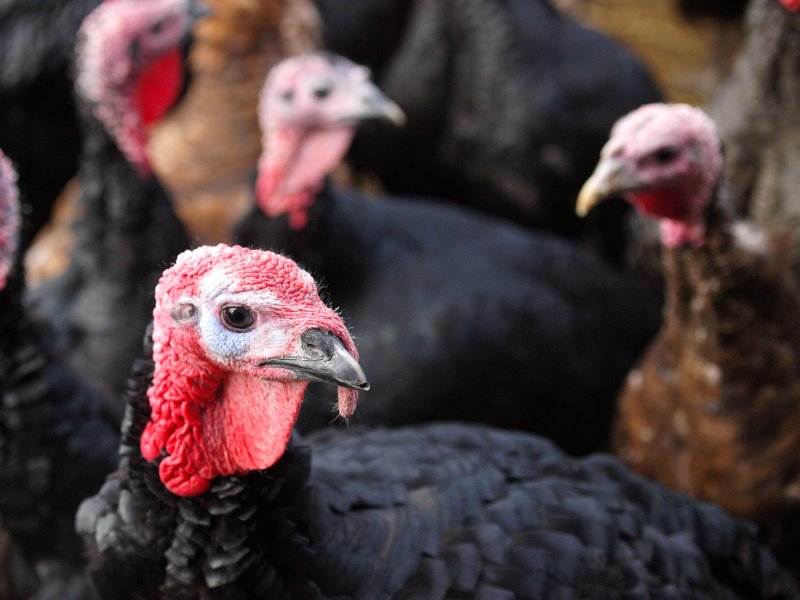
Farmers who produce turkeys for Christmas have been told that now is the time to start planning as decisions need to be made on feeding programmes.
Traditional breeds, such as bronze turkeys, are usually used for seasonal production as they are perfect for a whole bird roast and quality taste.
For this reason, and the fact they are free range, nutritional specifications will be different to those for year-round commercial production.
The Traditional Farm-fresh Turkey Association (TFTA), a group of around 40 farms supplying traditional turkeys specifically for Christmas, sets a high standard for Christmas turkeys.
Requirements of the TFTA’s Code of Practice include that turkeys must be from high welfare and slow-growing strains, traceable to hatch date and flock.
Turkeys must also be grown to maturity in strictly no less than 20 weeks, and housing should provide a minimum of 25kg per square meter.
A natural cereal-based diet must be included, with no medication, unless vet prescribed. From 10 weeks it should contain a minimum of 70% cereals.
Andrew Fothergill, national poultry advisor for feed firm ForFarmers, explains why seasonal turkey producers should buy a sound nutritional package.
“Optimal nutrition is essential to support growth, promote health and help to deliver the superior meat quality expected from a Christmas turkey," he said.
"Turkeys have different nutritional requirements depending on the life stage – specifications should be matched to associated needs and challenges.”
Nutritional solutions are often added to diets to support the turkeys through challenges, assisting immune function and promoting wellbeing.
“We fortify diets to support growth, promote health and help to deliver superior meat quality,” Mr Fothergill stated.
Examples include essential oils and prebiotics to promote beneficial microflora of the gut: “Enzymes are added to ensure the optimal utilisation of nutrients and prevent anti-nutritional factors interring with digestion," he added.
"Also helping to maintain digestive health and litter quality, which means that birds will be cleaner and easier to pluck.”
He explained how the ForFarmers formulations include the strategic use of natural plant extracts to reduce pathogen colonisation - supporting health and immune function.
The inclusion of a specific Vitamin D metabolite supports skeletal development, helping to deliver early growth and uniformity.
Antioxidants such as vitamin E and selenium, along with Omega 3, are also important for skeletal development; as well the immune system and growth.
Betaine enhances intestinal function and health; as well as supporting metabolic activity and protein accretion.
Mr Fothergill explained: “With a large bird like a turkey it is particularly important to have optimal calcium status and skeletal development.
"At Christmas, customers are looking for excellent breast and thigh meat eating quality, a pleasing appearance and good carcass confirmation.”
For the producer, it is 'key' to meet these targets in an efficient manner in order to achieve expected profits: “The formulation of our diets seeks to support these aims, by selecting quality raw materials, optimising specifications and using additives.
"We use the right types of fat and natural antioxidants in the diets to ensure good shelf life,” Mr Fothergill said.
Omega-3 rich fish oils are also used for these benefits to gut health and the immune system. Fibre is important for the digestive health and wellbeing of all poultry.
“Litter eating exposes birds to greater pathogens and parasite load, by adding sources of indigestible fibre this is reduced, along with vices such as feather pecking.”
Feather quality is essential for both feed efficiency and carcass quality: “Well insulated birds are feed efficient birds and good feathering delivers cleaner carcasses.
"It also means less scratches, which can lead to infections and downgrading of the carcass; as well as having food safety implications.”
Stress during slaughter should also be minimised to maintain optimum eating quality – as cortisol production can lead to tough meat.
Mr Fothergill summarised: “ForFarmers Traditional Turkey range is designed to provide optimal nutrition from day old to marketing.
"Our range of feeds are aimed at satisfying the needs of traditional turkey breeds and meeting the requirements of the main auditing schemes of production such as the Traditional Farm Fresh Turkey Association.”
